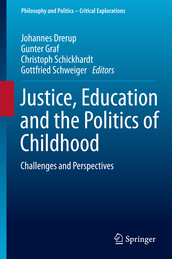|
The next forum section of the Zeitschrift für Praktische Philosophie (ZfPP) will be dedictated to questions relating to doing philosophy as a job and within the institutional setting of a university. The subtitle suggests the topics potential papers can examine: precarisation, publish or perish, dream job? Given the situation at many universities and the bleak prospects for most younger and many not so young colleagues discussions need to start now. The ZfPP is a fully open access journal and publishes papers in German only. Hence the call for papers is also in German:
Philosophie an der Universität: Prekarisierung, Publish or Perish, Traumjob? Aufruf zur Einsendung von Beiträgen für ein Forum in der Zeitschrift für Praktische Philosophie Schon seit längerer Zeit ist der Zustand der Philosophie als Wissenschaft und Teil der Universität und die Bedingungen, unter denen PhilosophInnen arbeiten und Philosophie professionell betreiben, ein Thema. Insbesondere die Situation des Mittelbaus muss großteils als prekär und unsicher bezeichnet werden, was nicht ohne Auswirkungen auf die Lebensqualität der betroffenen KollegInnen bleibt. Das ist sicherlich nicht eine für die Philosophie spezifische Situation, sondern Veränderungen auf Ebene der Universitäts- und Wissenschaftspolitik im Allgemeinen geschuldet. Veränderte Anforderungen betreffend Publikationsstrategien, Evaluationen gemäß Drittmitteleinwerbung oder auch Outreachaktivitäten, die in die Welt außerhalb der Universität wirken sollen, sind wiederum nicht auf den Mittelbau und philosophisch-akademischen Nachwuchs beschränkt – obwohl diese besondere Drücke verspüren hier mitzuziehen und sich anzupassen – sondern entfalten eine breitere Wirkung. Andere Probleme, wie die Verteilung von Macht und Ressourcen innerhalb philosophischer Institute, Abhängigkeitsverhältnisse zwischen DoktorandInnen/AssistentInnen und ProfessorInnen oder auch Sexismus innerhalb der Disziplin haben sicherlich schon eine längere Geschichte, aber auch sie sind in die vorgegebenen Strukturen und Bedingungen eingebunden und durch diese mitbestimmt. Praktische Philosophie, also Ethik, Sozialphilosophie, politische Philosophie oder Rechtsphilosophie, kann und sollte auf die Verfasstheit der Philosophie als Beruf und als Teil der (universitär betriebenen) Wissenschaften reflektieren und auch mithelfen, Lösungsvorschläge formulieren. Aus diesem Grund widmet die Zeitschrift für Praktische Philosophie (ZfPP) diesen Fragen ein Forum, in welchem wir Essays, politisch-praktische Interventionen und akademische Reflexionen sammeln wollen. Wir rufen alle KollegInnen auf, sich mit Beiträgen an diesem Forum zu beteiligen. Die Beiträge sollen einen Umfang von ca. 20.000 Zeichen haben und gemäß den Zitationsvorgaben der ZfPP gestaltet werden. Einsendeschluss ist der 1. September 2016. Das Forum wird in der Dezemberausgabe 2016 der ZfPP erscheinen und alle Beiträge werden von den HerausgeberInnen, gegebenenfalls unter Beiziehung von Mitgliedern des Wissenschaftlichen Beirats, redaktionell betreut. Entsprechend der Textsorte und dem Charakter des Forums wird es jedoch kein blindes Begutachtungsverfahren geben. Die Homepage der ZfPP mit allen Informationen: www.praktische-philosophie.org Wir hoffen auf eine rege Beteiligung und vielfältige Reflexionen und Argumente! Für Fragen und Anregungen stehen wir jederzeit zur Verfügung! Die HerausgeberInnen Gunter Graf Martina Schmidhuber Gottfried Schweiger Michael Zichy I have recently finished a paper on the Sustainable Development Goals (SDG) and the issues that need to be addressed to make them a real progress. The paper will be published as a chapter in an upcoming book I am editing together with Helmut Gaisbauer and Clemens Sedmak for the the Austrian Chapter of Academics Stand Against Poverty (ASAP) that explores ethical issues in poverty alleviation. The book will be published with Springer in the next few months.
You can downlaod the paper from my academia.edu page. This is the abstract: In this chapter, I will provide a philosophical commentary on the Sustainable Development Goals (SDGs), which will play a key role in global poverty reduction in the next 15 years. In particular, I will focus on five issues: possible trade-offs, the task of prioritization, the vagueness of the SDGs, the required coordination to implement the SDGs and the establishment of a system of sanctions against actors who fail to achieve the SDGs. Firstly, moving forward with measures to realize the SDGs will most likely demand trade-offs between certain goals; therefore, it is urgent to identify which trade-offs are likely to occur and understand how to choose those goals that should be pursued under such circumstances. Secondly, in addition to possible trade-offs, it is likely that some goals are more easy to achieve than others and that states, as well as international institutions, will have to decide where to invest the money. This probably means that some goals will be prioritized over others, with investments focused more on their achievement, at least in the short-term. Thirdly, although the SDGs cover 17 goals with a total of 169 targets, many of them are still very vague. It will be necessary to set measureable and feasible benchmarks, which can be used to track progress. Fourthly, the SDGs are ambitious and, therefore, the possibility that they will not be achieved is, unfortunately, rather high, especially if the vagueness of some of the targets is not exploited in order to achieve at least low levels of progress. Until now, not much is known about the strategies behind achieving the SDGs and how this global effort will be coordinated, as well as whether the current global framework of institutions is fit for that task. Fifthly, it is certain that, if the SDGs fail the poor and other vulnerable populations, there will be no fearful consequence for other populations, particularly those in rich countries.  IV. Tagung für Praktische Philosophie 29./30. September 2016 Universität Salzburg Keynotes: Peter Schaber (Zürich) und Elif Özmen (Regensburg) Konferenzsprachen: Deutsch und Englisch Wir laden alle interessierten Kolleg_innen, mit und ohne universitäre Anbindung, aus dem gesamten Spektrum der praktischen Philosophie (angewandte Philosophie, Sozialphilosophie, Ethik, Rechtsphilosophie, politische Philosophie etc.) und verwandter Disziplinen ein, Vorschläge für Beiträge einzusenden. Diese können fertige Aufsätze, Teile aus größeren Arbeiten, work in progress oder gescheiterte Versuche, im Denken voranzukommen, sein. Für jeden Vortrag sind 30 Minuten inkl. Diskussion vorgesehen. Vorschläge für Beiträge (im Umfang von ca. 250 Wörtern) bitte bis 1. Mai 2016 an philosophie(at)sbg.ac.at Für freuen uns auch über die Einreichung von thematischen Panels, also der Zusammenstellung von drei themenbezogenen Vorträgen. Weitere Informationen unter: http://www.uni-salzburg.at/zea/praktphil ENGLISH VERSION: IV. Conference on Practical Philosophy 29./30. September 2016 University of Salzburg Keynotes (in German): Peter Schaber (Zürich) und Elif Özmen (Regensburg) Conference Languages: German and English We invite all interested colleagues (graduate, postgraduate, doctoral students, postdocs, etc), with and without university connections, from the whole range of practical philosophy (applied philosophy, social philosophy, ethics, philosophy of law, political philosophy, etc.) and related disciplines to submit proposals for contributions. These can be finished essays, parts of larger works, work in progress or failed attempts to get ahead in thinking. For each presentation 30 minutes (including discussion) are provided. Proposals for contributions (to the extent of about 250 words) should be sent to philosophie(at)sbg.ac.at until 1. May 2016. We also welcome proposals for thematic panels. For further information, see http://www.uni-salzburg.at/zea/praktphil or contact philosophie(at)sbg.ac.at  Finally, a new volume on political philosophy and children that I co-edited is out with Springer. It is loosley based on a workshop I co-convened in Manchester. To be honest, my co-editors did most of the work for this book to happen. As the title suggests the chapters in this book are engaged with the moral, legal and political status of children and childhood, most of them by examining a concrete problem or question in education or politics. This is the table of contents: Part I The Ethics of Childhood: Autonomy, Well-Being and Paternalism
Part II Justice for Children
Part III The Politics of Childhood
Here is the link to Springer: http://www.springer.com/gp/book/9783319273877 The program of the 2016 Workshop in Philosophy and Poverty, which will take place at my home institution on May 12 and 13, 2016 is now online (I am mainly responsible for the organization of this event). It looks like it's going to be a wonderful workshop with very interesting people, including myself :-) Registration is free and possible until the End of March, places are limited due to space: www.philosophypoverty.blogspot.com Today the new issue of the Zeitschrift für Praktische Philosophie (ZfPP) [Journal for Practical Philosophy] was published. The ZfPP is fully open access journal, which I co-founded in 2014. In this issue the reader can find papers on two special topics ("duties and responsibilities" and "children and parents"), and we also included a special section with short essays on the current refugee crisis. All papers are in German.
All papers can be downloaded for free: www.praktische-philosophie.org I just had (once again) a not very satisfying experience with a journal. A paper that I have written together with a colleague was rejected, but that is not the problem. We all know that acceptances are rare and rejections are common and we have to learn to deal with that. But this time our paper was not just rejected. We submitted the paper and after a few weeks we got an e-mail that review process will take approximately three months. After waiting for another four months we wrote a very friendly e-mail inquiring about the status of the review process. This time the answer was fast. We got an e-mail on the same day informing us that our paper was rejected. The editorial assistant also let us know that they got two reviews, one of which was negative, and he then cites the negative review (or parts of it because it was not very long) pointing out that our paper deals with an important topic but invests too much on metaethical issues and that its conclusions are not very interesting. The review, finally, suggests to give the paper a new structure and to rewrite some parts of it. OK, we disagree with some of that criticism but so is (peer-review) life. What I do not understand are two things that could be better and would make a rejection a bit less unpleasant:
(1) Why wait until you are asked to let authors know about the rejection?? I cannot believe that the review(s) just arrived within that 12 hours between our inquiry and the rejection e-mail. (That only gives reason to speculate if the reviewer was emailed again after our inquiry and s/he then wrote a quick review to get it of her/his desk.) (2) If you get two reviews please pass along both, especially if it seems that only one of them was negative and the other positive. Yes, we will deal with the criticism but it also helps to read what people liked about your work and what you got right. I (co)organize two workshops on (political) philosophy and poverty next year at the Centre for Ethics and Poverty Research, University of Salzburg, and in collaboration with the Austrian chapter of Academics Stand Against Poverty (ASAP). Please spread the word.
The first workshop with Monique Deveaux (U of Guelph) will take place on May 12 and 13, 2016. There is no specfic theme and all papers on philosophy and poverty are welcome but preference will be given to papers that are related to the topic of the paper of Monique Deveaux: “Global Justice from Below?: The Value of Social Movement Approaches to Poverty Reduction”. The detailed call for papers and more information on that workshop can be found in that PDF or here: www.philosophypoverty.blogspot.com The second workshop on August 24, 2016, will focus on political philosophy and child poverty with invited talks by Colin Macleod (U of Victoria) and Serena Olsaretti (ICREA – Universitat Pompeu Fabra). The detailed call for papers and more information on that workshop are in that PDF or here. Deadline for submissions is for both workshops January 31, 2016. For inquiries please contact Gottfried Schweiger at gottfried.schweiger@sbg.ac.at |
Gottfried Schweiger
I am a social and political philosopher. Archives
September 2018
|
 RSS Feed
RSS Feed
